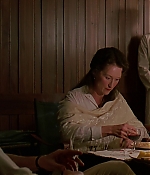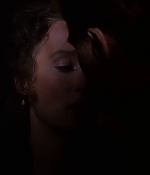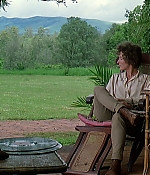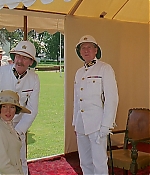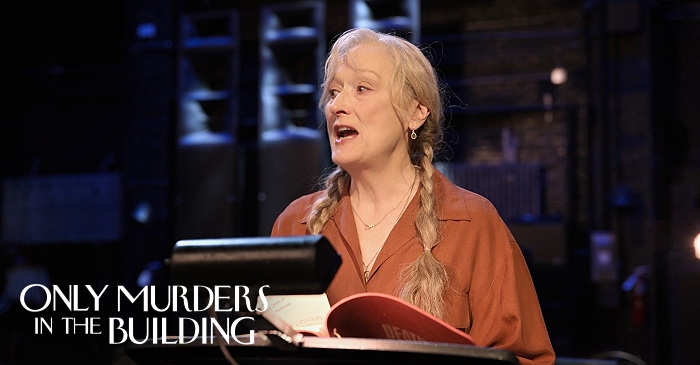|
Simply Streep is your premiere source on Meryl Streep's work on film, television and in the theatre - a career that has won her the praise to be one of the world's greatest working actresses. Created in 1999, we have built an extensive collection to discover Miss Streep's body of work through articles, photos and videos. Enjoy your stay.
|
Celebrating
25 years
of SimplyStreep
|
Today’s Movie of the Week fits perfectly for a rainy Sunday – Sydney Pollack’s 1986 “Out of Africa”. Lots of updates have been made for the film, including new DVD screencaptures, deleted scenes and documentary screencaptures as well as over 100 re-added production stills and on-set pictures. Three new clips can be found in the video archive. Also, make sure to read the site special about the real Karen Blixen. Production notes and review after the cut. As always, please share your thoughts on “Out of Africa” in the comments. For the Movie of the Week section, only three films are left, and I’ve saved my three personal films for the finale, so check back next Sunday.
Out of Africa (1985) is based on the 1937 book by Danish writer Isak Dinesen. The film tells the autobiographical tale of Baroness Karen Blixen (Dinesen’s true name), portrayed by Streep, and her time spent on a coffee plantation in East Africa in the early twentieth century. Blixen, in the film, marries Baron Bror Blixen-Finecke (Klaus Maria Brandauer) and moves with him to Africa. The marriage is most unsatisfactory as he is a womanizer who eventually leaves her to take care of the plantation on her own. The Baroness meets a hunter named Denys (Redford), and the two begin an idyllic love affair.
Right after ‘Plenty’, I dyed my hair dark, and we flew from England to Africa. For six months we lived there. It was fantastic. My son spent the second half of first grade there. You know there are different styles in motion pictures. There was a time when nobody ever wanted to have narration over anything. I remember Sydney saying, ‘Oh, my God, we can’t seem to find any other way! I hate voice-overs, they’re horrible, pedestrian, the worst kind of filmmaking!’ Well, now most of the cutting-edge movies all have voice-over narration. But in the 70’s and early 80’s, it wasn’t considered ‘pure’. I’d say, Gee, Orson Welles did well with it, you know? My father said, ‘You’re going to take these children to Africa? What an irresponsible thing to do.’ I told him it was going to be a great adventure. Three weeks later, a sore appeared on my five-year-old son and nobody knew what it was. It turned out to be some horrible worm. Years later we found out the doctors thought he might have had Aids. (Meryl Streep, Entertainment Weekly, March 2000)
The idea of adapting the Dinesen’s memoirs to the screen had been thrown around for decades before the project was finally picked up by Universal Studios. Orson Welles and David Lean had both considered making the film, and Nicholas Roeg thought about making the film with Julie Christie starring as Karen. Sydney Pollack was the one to produce the film in the 1980s, along with directing it. Out of Africa was shot on location in Africa; the city of Nairobi was recreated by local workers as it had appeared in the early 1900s. The production was not without its share of problems. The country was in the middle of a drought during filming, and the crew had to consider moving to a different location; the rains came just as they were attempting to decide where to relocate. Many crew members contracted malaria, and filming animals in the bush posed its own special problems. It is illegal to touch or maneuver wild animals, so the crew had to camp out for hours while they waited for the animals to come into just the right spot for each shot. Despite the difficulties encountered, many would say it was well worth it, because the film was nominated for a total of eleven Academy Awards, winning seven of them.
She’s a great actress because of her intuitiveness, her powers of observation and her sense of being in touch with herself quickly – all that, along with talent. She has a vast imagination; she has incredible intuitive powers; she understands instantly things about human behavior that people who aren’t observant don’t understand and people who are narcissistic don’t understand. You have to be paying attention to the outside world, and most people are not. Most people are wondering how they’re doing; they’re looking in your eyes, thinking, “I wonder what she thinks of me?” You’re not going to learn about human behavior like that. She’s in the world, interested in the world. She lives a full life, (and) she’s experienced what she needs to experience: motherhood, love, frustration. (Sydney Pollack, The Hollywood Reporter, June 2004)
“Out of Africa” took home the statues for Best Picture, Best Director, Best Screenplay Based on Material from Another Medium, Best Cinematography, Best Art Direction-Set Decoration, Best Sound, and Best Original Score. Streep’s nomination for Best Actress marked her sixth nomination, and though she did not win (the Oscar went to Geraldine Page for The Trip to Bountiful), her role in this film is still considered to be one of her best.
Frederik’s Review
“Out of Africa” is Sydney Pollack’s love letter to Karen Blixen and to the continent that has influenced and changed the author’s life. There is more to the story than expected at first sight. Blixen is bored with her life in Denmark and marries for social reasons to flee from her past to Africa. Soon she finds herself alone, since her husband isn’t interested in her friendship nor in her person. The heart of the film, personally, is not so much the relationship to Denys, but Blixen’s effort to make a difference in the country she learns to love so passionate, and for the people who she shares ground with. The romance with Robert Redford’s character just adds to that, mostly because their characters stay different and difficult. But the star of the film remains Africa – shown in astonishing images captured by cinematographer David Watkin and supported by John Barry’s brilliant score – both received the Academy Award for their work. Their contribution makes the film’s magic. Regarding the acting, Karen Blixen is yet another compelling performance during Streep’s successful 1980s career. The film proves to be her most successful of the decade as well, in regard of its box-office success as well as its seven Oscar wins. It’s been a classic already back then and has lived up to its standard ever since.

